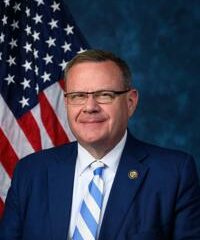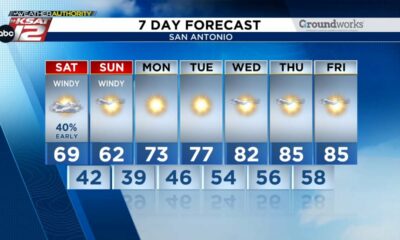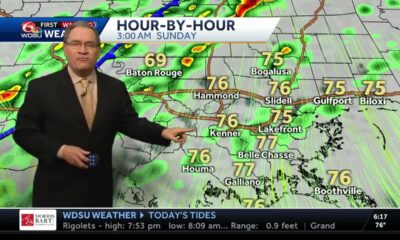News from the South - South Carolina News Feed
Three wildfires burn in McDowell County, crews make progress with containment
SUMMARY: In McDowell County, North Carolina, crews are working to control several active wildfires. The fires began on Bat Cave Road and Watson Place, with a third fire reported on American Thread Road. Although no injuries have occurred, one home has been damaged, and multiple outhouses have been destroyed. Additionally, a tree fell on power lines, igniting the fires. Currently, 250 acres are affected, with 15% containment. Roads are closed as family members anxiously await updates on potential evacuations. Officials plan to reassess the situation and provide new information before 8 a.m. this morning.

Three wildfires burn in McDowell County, crews make progress with containment
Subscribe to WYFF on YouTube now for more: http://bit.ly/1mUvbJX
Get more Greenville news: http://www.wyff4.com
Like us: http://www.facebook.com/WYFF4
Follow us: http://twitter.com/wyffnews4
Instagram: https://www.instagram.com/wyffnews4/
News from the South - North Carolina News Feed
Panel backs GOP effort to disqualify voters in NC high court race
More than 61,000 voters challenged by NC Supreme Court candidate Jefferson Griffin have 15 business days to prove their eligibility, or have their ballots removed from the count in Griffin’s 2024 bid to unseat Justice Allison Riggs, according to a Friday ruling from a three-judge panel of the NC Court of Appeals.
After all votes were tallied in November, the contest came down to 734 votes, with incumbent Riggs, a Democrat, in the lead. Soon thereafter, Griffin, a Republican Court of Appeals judge, asked for recounts and filed election protests.
The recounts maintained Rigg’s lead, while the State Board of Elections dismissed the protests.
Since then, Griffin’s legal challenges and countering lawsuits from Riggs have made their way through state and federal courts on their path to a delayed resolution while Riggs retains her seat.
Friday, the most significant decision in the case came down from two Republican justices on the North Carolina Court of Appeals. In a 2-1 decision from the panel, the court declared that Griffin’s protests were valid.
Incomplete voter registrations
The panel majority ruled that the largest portion of challenged voters, those who have “incomplete voter registrations” without a driver’s license or Social Security number included in their elections records, are ineligible to vote because they were not registered to vote correctly.
The blame lies squarely on the State Boards of Elections, which did not update voter registration form to make that information required in accordance with the federal Help America Vote Act, the panel majority opinion states.
Once the issue was identified in 2023, the State Board issued a new registration form, but didn’t go back and contact registrants who didn’t list a driver’s license or Social Security number, or check a box saying they had neither to be assigned a unique identification number.
Now, the appellate court panel says those voters are ineligible. The majority emphasized that the court has the right to remove ballots cast by these voters from the count, but is choosing not to do so immediately.
Instead, they are returning the case to the Wake County Superior Court, and instructing them to tell the State Board to contact impacted voters to provide them an opportunity to fill in the missing information. If voters do so within 15 business days of notification, their votes will count. If not, they will be removed from the count for the Supreme Court race, but not other races.
Overseas and military photo ID
The court panel ruled similarly on Griffin’s second protest, which challenged overseas and military voters who did not provide photo identification with their absentee ballots.
During legal proceedings, the State Board has argued that under the state’s Uniform Military and Overseas Voters Act, overseas and military voters are exempt from the voter ID requirement. UMOVA is contained in a separate statute from the one including photo ID requirements, and the Board argued that was intentional.
The appellate court panel disagreed. It ruled that the two statutes were intended to be read together, and that all voters are subject to the photo ID requirement.
Again, implicated voters have 15 business days to provide photo identification or an exception form, or be removed from the count.
In his dissent, Judge Toby Hampson, the loan Democrat on the panel, said providing time to fix these issues does not make up for the fact that impacted voters followed the rules available to them at the time.
“The proposition that a significant portion of these 61,682 voters will receive notice and timely take curative measures is a fiction that does not disguise the act of mass disenfranchisement the majority’s decision represents,” Hampson wrote.
Panel nixes ‘Never Residents’
North Carolina law includes an exception to the state constitution’s residency requirement for a small subset of voters labeled “Never Residents:” overseas U.S. citizens who were born outside the country and whose parents or legal guardians’ last residence was North Carolina.
Friday, the appellate court ruled that statute ran afoul of the state Constitution, and voided the votes of Never Residents.
Panel dissent and equal protection issues
Hampson’s dissent had a few arguments that may be seen again in future litigation.
First, he questioned the timing of Griffin’s protests. The statutes and Board interpretations that are being challenged have been in existence for several election cycles.
The majority declared that eligibility is determined as of Election Day, Hampson noted.
“Despite professing this basic tenet, the majority changes the rules of the 2024 election — and only for one race — months after election day,” he wrote. “It does so even though there is no actual showing or forecast that any challenged voter was not registered or otherwise unqualified to vote.”
Second, Hampson objected to which votes are being challenged. All protests include only early and absentee voters, since that was the information Griffin had available at the time he filed them.
Additionally, the overseas and military photo ID protest only includes Guilford County ballots.
“Each of these voters is at risk of being disenfranchised while similarly-situated voters are not, simply because of the county in which they reside, when they cast their ballot, or their physical location,” Hampson wrote.
What’s next after appeals panel?
The appellate decision may be key in determining the ultimate outcome of the race.
Riggs has already declared her intention to appeal the decision to the North Carolina Supreme Court, calling it a “deeply misinformed decision that threatens to disenfranchise more than 65,000 lawful voters and sets a dangerous precedent, allowing disappointed politicians to thwart the will of the people.”
However, if the North Carolina Supreme Court comes to a very possible 3-3 tie, the appellate court’s decision would be the one that stands. Either way, if the state high court fails to take the case or acts to leave the panel’s ruling in place, Riggs’ legal team has indicated it will likely return the case to the federal courts on equal protection grounds.
The State Board also issued a statement saying that they would comply with the order, if it goes into effect.
“Regardless of the ultimate outcome of this ongoing legal dispute, any voter who is concerned that their voter registration information is incomplete or is not up to date should submit an updated voter registration form,” the statement read.
Democratic National Committee Chair Ken Martin was less neutral.
“This partisan decision has no legal basis and is an all-out assault on our democracy and the basic premise that voters decide who wins their elections, not the courts,” he said in a statement. “If upheld, this could allow politicians across the country to overturn the will of the people.”
While Griffin has stayed mum since November, North Carolina Republican Chairman Jason Simmons called the ruling a “victory for the rule of law and election integrity” in a social media post.
“This decision and order finally holds the N.C. State Board of Elections accountable for their actions and confirms every legal vote will be counted in this contest,” he wrote.
This article first appeared on Carolina Public Press and is republished here under a Creative Commons Attribution-NoDerivatives 4.0 International License.![]()
The post Panel backs GOP effort to disqualify voters in NC high court race appeared first on carolinapublicpress.org
News from the South - North Carolina News Feed
Gun bills in NC General Assembly are drawing concern, criticism
RALEIGH — Juliet Rosa, a survivor of domestic violence and UNC-Chapel Hill student, is “a little bit overwhelmed” by this session’s plethora of gun bills, which include so-called constitutional carry legislation, sentence enhancements for crimes involving firearms and a measure proposing North Carolina as a Second Amendment sanctuary state.
If North Carolina lawmakers pass these bills, Rosa may just pack her bags and leave.
Gun bills aren’t novel in North Carolina, but there weren’t too many major changes until 2023. That’s when lawmakers narrowly repealed a century-old pistol purchase permit requirement over Democratic Gov. Roy Cooper’s veto, said state Rep. Pricey Harrison, D-Guilford.
[Subscribe for FREE to Carolina Public Press’ alerts and weekend roundup newsletters]
This year, several Republican lawmakers want to continue the trend and allow North Carolinians to carry hidden handguns without a permit, too. While they’re at it, they plan to lower the minimum age to carry from 21 to 18.
If signed into law, North Carolinians would no longer have to take an eight-hour gun safety course, provide a local sheriff a set of fingerprints or demonstrate an ability to shoot a gun before being allowed to carry a concealed weapon.
Stronger gun rights bills have progressed this session despite public and private opposition. Relative quiet from law enforcement groups, lobbying pressure and national politics may be to blame.
The fate of these bills, following a likely veto from Gov. Josh Stein, is uncertain.
But over a dozen Democrat amendments and bills seeking to add safety measures to these bills have failed, hinting at a possible rerun of the pistol permit playbook, which involved strategic absences to give Republicans enough votes to override vetoes on their own.
From pistol permit to constitutional carry
On March 29, 2023, Harrison said Democratic state Reps. Cecil Brockman and Michael Wray “made themselves absent” for a key vote — the veto override of Senate Bill 41, which repealed the requirement to get a pistol-purchase permit from a sheriff before buying or transferring a firearm.
Without their votes, the state House was able to override Cooper’s veto with only Republican support.
“It was very frustrating for us to watch that happen,” Harrison said.
The National Rifle Association and a group called Grassroots North Carolina had been lobbying for the bill’s passage for years. Before 2023, they always hit a roadblock, Harrison said. North Carolina’s sheriff and law enforcement agencies would reliably push back, and lawmakers would heed their warnings.
But in recent years, that obstacle disappeared. The sheriff’s association became more partisan along urban-rural lines and law enforcement got quieter, Harrison recounted.
She’s worried history might repeat itself with this session’s gun legislation.
Under the gun
Between 2022 and 2023, only four states experienced an increase in gun sales: Illinois, New Hampshire and Florida had minimal increases of 1 to 5%.
North Carolina, however, had a 112% increase — by far the biggest surge, according to one analysis. That increase can be traced back to the pistol purchase permit law.
Everytown for Gun Safety policy expert Sam Levy sees that as a sign of what’s to come.
Everytown for Gun Safety is a nonprofit representing gun violence survivors. Last election cycle, they made over $7 million in political contributions and almost cracked the top 100 of contributors nationwide, according to Open Secrets. That included a $500,000 donation to the North Carolina Democratic Leadership fund.
“There’s no question in my mind that repealing the concealed-carry permit will have a similar sort of result, which is a huge spike in the number of guns being carried in public in North Carolina,” he said.
Chet Effler, the president of the North Carolina Fraternal Order of Police, told Carolina Public Press in a statement that the organization hadn’t reviewed or researched the session’s gun bills. Instead, Effler said the focus was on “law enforcement specific bills” for now.
Wake County Sheriff Willie Rowe said in a statement that his office is actively monitoring this legislation and “will continue to work with lawmakers to advocate for policies that prioritize the well-being of our community and law enforcement officers.”
Orange County Sheriff Charles Blackwood said he has a rule: Don’t talk about bills until they become law. He doesn’t want to endorse something that may change into something entirely different.
But public safety officers’ relative silence hasn’t stopped lawmakers from speaking on their behalf.
Mecklenburg Democratic state Sen. Mujtaba Mohammed, for one, is convinced that removing concealed-carry permit requirements will make it harder for police to do their jobs, since those carrying weapons may or may not have much training or experience with guns.
“You’re going to kill police officers with this bill,” Mohammed said during a March committee meeting.
Republican state Sen. Danny Earl Britt Jr., the bill’s sponsor, replied that no law enforcement agency had come forward with that concern.
“I firmly believe that good people with guns stop bad people with guns,” Britt said.
Current law states that to obtain a mandatory concealed-carry permit, a person must complete an application under oath at a sheriff’s office, provide two full sets of fingerprints, complete an approved handgun safety course, allow a local sheriff access to records about an applicant’s mental health or capacity and pay an $80 fee. North Carolinians have to be 21 or older to get a permit.
The training requirement to obtain a permit involves a Saturday morning and afternoon and firing the weapon roughly 20 to 30 times, Britt said.
“We’re not talking about a robust training program that people go through,” he said. “The training aspect is minimal, at most, and the idea that you have to go through that process we believe goes against everything in the Second Amendment.”
Both the Senate and House versions of the constitutional carry bill are in the House, waiting for the Rules Committee to take further action.
Is the Second Amendment limited?
In 2008, the Supreme Court decided in the D.C. v. Heller case that the Second Amendment protects individuals’ rights to keep and bear arms for self-defense and other lawful uses, Campbell University constitutional law professor Gregory Wallace said.
But it didn’t grant an absolute right.
Nobody could carry any type of firearm, anywhere at any time. Certain people, like convicted felons, couldn’t have a firearm. Certain places, like courthouses and schools, were off-limits. So were military-style weapons too dangerous for civilians. And the court made space for reasonable restrictions on buying and selling firearms.
In 2021, the U.S. Supreme Court struck down a New York law that would have made gun owners provide a special reason to carry a concealed firearm in public. The majority opinion stated that for a gun restriction to be permissible, there has to be a historical parallel. The government has to prove that the law is consistent with the nation’s history and tradition of firearms regulations, Wallace said.
“It’s not just black and white,” he said. “It’s a bit complicated.”
Levy said Everytown for Gun Safety’s work is about striking a balance between respecting the right to carry guns and public safety. That balance is often found in responsibility, and understanding the risks and rules surrounding gun ownership, he added.
Democrats have filed dozens of gun-related bills and amendments this session attempting to strike that balance.
They include bills that would make it a crime to leave a firearm in an unlocked, unattended vehicle, require gun owners to report loss or theft of their firearm to local law enforcement within 24 hours and establish “protective orders” to temporarily remove guns from people if they are a danger to themselves or others.
But in the North Carolina legislature, giving a little may be seen as a slippery slope.
None of these Democrat-led efforts have gotten much traction.
“I think there are folks in the Republican caucus who think maybe this isn’t a great idea to have 18-year-olds running around with no training carrying concealed weapons,” Harrison said. “I myself have heard from gun shop owners who are opposed to the bill, even though it makes more business for them, because they think it’s dangerous.”
Brian Sisson, owner of The Range in Ballantyne, is one of those owners. Sisson has noticed delays in getting concealed-carry permits, but he doesn’t think the solution is removing the requirement. Instead, he suggested getting permits “out of the sheriff’s hands” and allowing instructors to run background checks after applicants pass the training course.
“I have concerns that you’re potentially going to have individuals out there who are carrying firearms who don’t know what the law is,” Sisson said.
‘Idiotic and dangerous’
In August 2023, UNC-Chapel Hill went on lockdown for hours. The university’s alert system notified students of an active shooter, who it was later revealed had killed a professor.
The experience pushed Rosa to get involved with Students Demand Action. But Rosa and her peers mostly saw an increase in police presence on campus, which didn’t make them feel more at ease.
“We didn’t really see much meaningful change occur after that to make the campus safer,” Rosa said.
Students Demand Action asked UNC-Chapel Hill to create a translation option for the university alert system after discovering some Spanish-speaking employees worked through lockdown, not realizing they were in danger. The school has been slow to act, Rosa said.
Now, Rosa is seeing the same kind of behavior from the North Carolina legislature, which won’t give Democratic amendments — which include safe firearm storage requirements, extreme risk protection orders and gun-free zones at voting sites, domestic violence and homeless shelters and health care facilities — much attention.
“I know that the issue of gun violence, just from a policy standpoint, can be pretty complex and contentious, but the idea that these permitless carry bills like (Senate Bill 50 and House Bill 5) are the solutions is pretty idiotic and dangerous,” Rosa said.
Survey says
Public opinion on removing concealed-carry permit requirements is fairly low, according to a March survey of about 600 likely voters.
A Cygnal survey found that 56% of respondents did not want North Carolina to allow permitless carry. An additional 17% would allow it, but with some restrictions.
Former Republican majority leader Paul Stam said groups like Grassroots North Carolina tried to put pressure on him to pass gun rights legislation, once calling him and two of his peers “the three weasels” and vowing to “exact retribution” on them for a vote the group didn’t like. It was an empty threat at the time, and the real power was the National Rifle Association, Stam said.
But in 2021, the NRA filed for bankruptcy and hasn’t contributed to North Carolina legislative races since 2022, according to campaign finance records.
“I’m sure the constitutional carry thing is coming from lobbyists, but I don’t really know who they are,” Stam said.
State Rep. Tracy Clark, D-Guilford, has noticed some mail from smaller gun rights groups that say they are tracking her voting record, but nothing too serious.
“I do think that this is a very small minority of Second Amendment rights legislators,” she said.
She thinks the NRA still has somewhat of a hold on some lawmakers. Clark’s a Second Amendment supporter; her husband is a gun owner. She isn’t trying to take anyone’s guns; she wants to prevent future gun violence. But while she’s tried to meet Republicans from that angle, she’s had little success.
But that inability to hold a productive conversation across the aisle could change as the NRA diminishes, Clark said.
“It’s breaking through that barrier to make them realize that it doesn’t have to be all or nothing,” she said.
Other gun bills
The North Carolina Firearms Coalition sent an email to supporters last week about a recent bill: The Second Amendment Protection Act.
The measure would bar state and local law enforcement from enforcing federal restrictions on gun rights.
“We don’t know who’ll sit in the White House after Trump,” the email read. “We don’t know when the next anti-gun tyrant will seize power. That’s why we must strike NOW and pass the Second Amendment Protection Act in North Carolina — before it’s too late!”
If enacted, North Carolina would be a Second Amendment sanctuary state, similar to cities that don’t enforce federal immigration law.
Clark was thrilled when she saw the title of Republican Rep. Jennifer Balkcom’s bill: The Gun Violence Prevention Act.
She was less enthused when she read it.
The bill enhances sentences for possessing, brandishing or discharging a firearm while attempting or committing a felony. Several other bills under consideration this session also increase punishments for crimes involving guns.
“It had nothing to do with prevention,” Clark said. “So the title was a misnomer, and it was actually the same title of a bill Pricey (Harrison) and others have been filing for prior years of actual preventative measures.”
During a committee hearing, Balkcom said her bill would target repeat offenders and create “stronger accountability.”
Research shows sentence enhancements don’t work to deter gun violence, said Levy, the Everytown for Gun Safety policy expert. But talking about the need to be “tougher on criminals” and “lock them up” are common refrains from people who “don’t want to have real conversations” about the issue, he said.
“It’s a distraction,” Levy said. “It’s not a real solution.”
This article first appeared on Carolina Public Press and is republished here under a Creative Commons Attribution-NoDerivatives 4.0 International License.![]()
The post Gun bills in NC General Assembly are drawing concern, criticism appeared first on carolinapublicpress.org
News from the South - South Carolina News Feed
South Carolina clinic loses funding due to federal changes to DEI mandates
SUMMARY: Unity Health on Main, a Greenville clinic serving uninsured and Medicaid patients, faces a funding crisis after significant federal changes to DEI mandates led to the loss of a $140,000 grant and the freezing of $650,000 in federal money. With 70% of its funding from grants, the clinic’s operations are at risk, potentially leaving over 2,300 patients without care. The clinic’s leadership is seeking $350,000 through pledges, forgivable loans, or other grants to stay open. An open house is scheduled to showcase their services, emphasizing their mission of affordable, compassionate healthcare for all.

Upstate clinic loses funding due to federal changes to DEI mandates
Subscribe to WYFF on YouTube now for more: http://bit.ly/1mUvbJX
Get more Greenville news: http://www.wyff4.com
Like us: http://www.facebook.com/WYFF4
Follow us: http://twitter.com/wyffnews4
Instagram: https://www.instagram.com/wyffnews4/
-

 Mississippi Today4 days ago
Mississippi Today4 days agoPharmacy benefit manager reform likely dead
-

 News from the South - Oklahoma News Feed7 days ago
News from the South - Oklahoma News Feed7 days agoTornado watch, severe thunderstorm warnings issued for Oklahoma
-

 News from the South - Kentucky News Feed5 days ago
News from the South - Kentucky News Feed5 days agoTornado practically rips Bullitt County barn in half with man, several animals inside
-

 News from the South - Alabama News Feed4 days ago
News from the South - Alabama News Feed4 days ago'I think everybody's concerned': Mercedes-Benz plant eyeing impact of imported vehicle tariffs
-

 News from the South - Oklahoma News Feed6 days ago
News from the South - Oklahoma News Feed6 days agoLife of David Boren memorialized in ceremony attended by hundreds
-

 News from the South - Missouri News Feed6 days ago
News from the South - Missouri News Feed6 days agoThunderstorms drench areas south of St. Louis
-

 News from the South - Kentucky News Feed7 days ago
News from the South - Kentucky News Feed7 days agoBowling Green Purples end 2024-2025 campaign as the state runner-up
-

 News from the South - Alabama News Feed5 days ago
News from the South - Alabama News Feed5 days ago41st annual Bloomin Festival Arts and Crafts Fair (April 5 & 6) | March 31, 2025 | News 19 at 9 a.m.











































